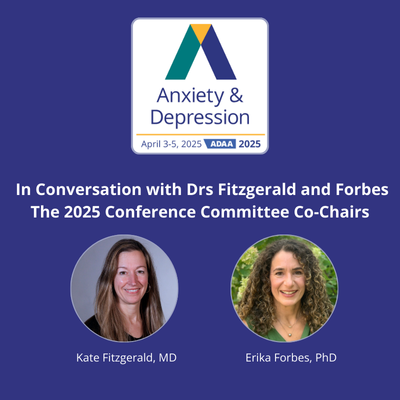Is youth mental health in a global crisis? It’s a redundant question but a google search on that phrase brings up an alarming number of results, just from 2024, that give a resounding yes – from the World Health Organization to UNICEF to the New York Times to the World Economic Forum to down under at the Australian Broadcasting Corporation. And that’s only the first page of results.
ADAA’s 2025 conference in Las Vegas (April 3 – 5) will focus on youth mental health. It seems superfluous to say that right now is the time for this focus. ADAA, its members, supporters, donors, and professional contributors have been working to improve the state of youth mental health for decades and understand the importance of addressing and treating mental health conditions as early as possible. But given today’s climate in the field of mental health, it does seem like there has never been a more crucial time.
ADAA recently spoke with the conference co-chairs about the theme, Navigating the Youth Mental Health Crisis: From Science to Solutions, their roles in preparing for the conference, their hopes for the event’s outcomes, and the work they do to advance mental health care and treatment for youth.
Co-Chairs Complement Each Other Like ADAA’s Conference Complements Research & Clinical Work
Speaking with Kate D. Fitzgerald, MD and Erika E. Forbes, PhD, you get the sense they were meant to co-chair an event together. Fortunately for ADAA, it’s our upcoming conference. The pair not only complement each other in their respect for one another’s passion and dedication to youth mental health, but both are clinicians and researchers, encompassing ADAA’s mission, work, and conference goals.
Dr. Fitzgerald, who has attended ADAA’ s conference for at least 20 years and was herself a CDLP award recipient, says that ADAA, through its work and conferences, is able to “thread the needle” between evidence-based research and clinical practice.
The Columbia University professor and child and adolescent psychiatrist told ADAA that she is particularly motivated to co-chair this conference on youth mental health with Dr. Forbes.
“I see huge waitlists for getting into clinics. Then there are treatments that are considered the gold standard but they don’t work for everyone, so we need other options for young people,” Dr. Fitzgerald said. “As a clinician, I want to improve services, treatments, and outcomes for youth with anxiety, OCD and depression. The conference pulls us together as clinicians and researchers to talk about cutting-edge strategies and approaches to help more of these youth.”
Dr. Forbes, a University of Pittsburgh depression researcher, clinical and developmental psychologist, and clinical neuroscientist, agrees with her co-chair.
“ADAA is like a breath of fresh air, balancing the clinical and the research sides beautifully,” Dr. Forbes said. “Other conferences may cover similar material and themes, but ADAA handles them in a special and effective way that brings together MDs, PhDs, and MSWs, and clinicians, researchers, students, and professionals all across the field who are studying and treating these disorders.”
Dr. Forbes adds that the ADAA conference allows attendees a chance to meet other experts in complementary areas, something a lot of other conferences don’t offer.
What Youth Mental Health Can Gain From the Conference
Drs. Fitzgerald and Forbes know they have their work cut out for them in not just chairing the conference, but also addressing various factors that affect youth mental health today. But they are aiming high and are up for the challenge. The conference’s schedule of events is in good hands.
Bringing together research and clinical experts is the highlight of ADAA’s conference, says Dr. Forbes, and members and attendees all share the same priorities but being in different worlds and networks has created some challenges. The co-chairs have come across a variety of suggestions from researchers and clinicians about speakers, sessions, symposia, and issues to address. But the upside, the co-chairs note, is they have a bigger pool of possible speakers and topics to choose from, yielding a conference that blends clinical and research priorities and perspectives.
The most pressing aspect of the conference is the need to address youth mental health immediately. The co-chairs discussed the rise in depression, especially among adolescent girls, the uptick in suicidality in young people and higher levels of anxiety and depression. They stressed the importance of identifying and intervening earlier and earlier to prevent chronic disorders.
“Even knowing which youth are most at risk presents opportunities to keep them on a healthy path. There are developmental windows where certain interventions are more likely to help,” the co-chairs said. “The brain is still growing and developing. An additional imperative to study and treat these disorders comes from how things got worse with COVID-19. Different youth have experienced different problems depending on whether the pandemic hit them during childhood or adolescence.”
Drs. Fitzgerald and Forbes are optimistic about working with youth, especially the youngest generations who, for the most part, are open when it comes to their mental health.
“It’s exciting to study and focus on mental health treatments for young people,” said Dr. Forbes, “they know it’s important and don’t find it as stigmatizing so they are more likely to ask for help and seek treatment. We have a great opportunity with young people now to address their challenges.”
Why Attend the Conference and What to Expect
It’s Vegas! The co-chairs, who even mentioned the word “fun”, are excited about Las Vegas, partly because of its convenient location for west coast members and attendees, but also because they hope it will attract new attendees in Nevada and surrounding states who might not have had the opportunity to attend an ADAA conference.
The most important reasons for attending the conference, Drs. Fitzgerald and Forbes say, are: researchers can obtain new ideas to incorporate into their work; clinicians can learn new techniques to bring into working with their patients; and clinicians and researchers alike can gain more confidence in being comfortable in what they don’t know and what they need to know and how to go about doing that. The co-chairs add that the conference reiterates the essential point of partnering together to advance youth mental health care, practice, and treatment.


